Microsoft and Apple are two tech juggernauts at the forefront of shaping the future of work, as both companies continue to invest in artificial intelligence (AI) tools.
On the consumer level, many of the advancements in AI focus on collaboration, productivity, and how remote and hybrid teams interact with technology in the modern workplace.
According to a report published by Web Pro News, Microsoft recently unveiled a suite of innovative solutions designed to enable seamless collaboration and harness the power of AI in hybrid work environments. Part of the company’s strategy centers on improving collaboration experiences through platforms like Microsoft Teams Rooms — which utilizes AI to improve virtual meeting experiences.
A key highlight of Microsoft’s AI offerings for businesses and professionals is Microsoft Copilot, an AI-powered assistant that automates repetitive tasks and provides intelligent insights across Microsoft office suite.
Meanwhile, Apple researchers have been developing its own AI language model called Reference Resolution As Language Modeling (ReALM).
According to a report published by Venture Beat, ReALM is an AI system that can understand ambiguous references to on-screen entities as well as conversational and background context. Researchers from Apple reveal in a white paper that ReALM is capable of achieving substantial performance gains compared to existing AI methods.
While Microsoft has been more aggressive in productizing generative AI across its ecosystem, Apple’s research and business strategies suggest that the company is rapidly escalating its AI ambitions as well. Last year, Apple purchased over 30 AI startups, according to report published by Statista.
The integration of AI-driven solutions into the workplace promises to transform how we collaborate, communicate, and work. The innovations from big tech companies this year will likely continue to shape the global workforce for years to come.



 Dr. Gleb Tsipursky – The Office Whisperer
Dr. Gleb Tsipursky – The Office Whisperer Nirit Cohen – WorkFutures
Nirit Cohen – WorkFutures Angela Howard – Culture Expert
Angela Howard – Culture Expert Drew Jones – Design & Innovation
Drew Jones – Design & Innovation Jonathan Price – CRE & Flex Expert
Jonathan Price – CRE & Flex Expert









